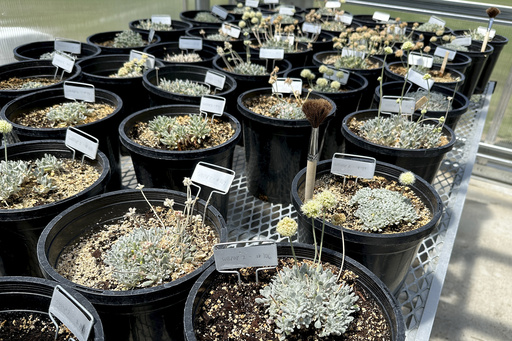
RENO, Nev. — In a significant move for President Joe Biden’s clean energy strategy, a federal permit has been granted for a new lithium mining project in Nevada. This development comes despite strong opposition from environmentalists, who have pledged to take legal action over concerns that the mine could threaten the existence of an endangered wildflower species.
The lithium being mined is critical for producing batteries for electric vehicles, which are central to Biden’s aims to reduce greenhouse gas emissions. Acting Deputy Interior Secretary Laura Daniel-Davis emphasized the importance of this project for embracing a clean energy future, stating, “It is vital for advancing the clean energy transition and promoting an economy of the future.”
Ioneer Ltd., the Australian company behind the undertaking, has been planning this mine for six years. They expect construction of the Rhyolite Ridge mine to commence next year in the arid region situated between Reno and Las Vegas. Officials predict that lithium production at the site will start in 2028, with enough output to supply batteries for approximately 370,000 vehicles each year for over twenty years. As global lithium demand is forecast to rise sixfold by 2030 in comparison to 2020, the significance of this project cannot be understated.
James Calaway, Executive Chairman of Ioneer, expressed confidence about the mine’s potential impact, describing it as one of the most significant lithium deposits in the world. He regarded the permit approval as a pivotal achievement and highlighted the hard work that led to developing a sustainable mining project.
The approval came from the Bureau of Land Management (BLM) after the Fish and Wildlife Service determined, following consultations mandated by the Endangered Species Act, that the mining operation would not threaten Tiehm’s buckwheat’s chances of survival. The wildflower, which grows to about six inches tall and produces yellow and cream blooms, was classified as an endangered species in December 2022, with mining activities cited as the primary risk to its habitat.
Some environmental groups are challenging the approval, asserting that it breaches various U.S. laws. The Center for Biological Diversity criticized the decision, arguing that the fight to protect this flower continues through litigation. Patrick Donnelly, the organization’s Great Basin director, emphasized that while lithium is essential for the energy transition, it shouldn’t come at the cost of losing endangered plant species.
Currently, there are less than 30,000 Tiehm’s buckwheat plants surviving in their exclusive native habitat, which spans a mere 10 acres. The Fish and Wildlife Service acknowledged concerns that the project would encroach upon critical habitats necessary for local bees and other pollinators, essential for the flowering plant’s reproduction. However, the service assured that no individual plants would be directly disturbed, and it believes that the proposed mitigation measures will facilitate the coexistence of the mine with the buckwheat population.
Critics argue this decision exemplifies how the Biden administration may be prioritizing climate action over the protection of wildlife, rare species, and indigenous lands. Donnelly reiterated their commitment to fighting for the buckwheat’s survival, asserting that their advocacy would not wane.
Nevada currently hosts the only operational lithium mine in the United States, with another one under construction close to the Oregon border. This project at Thacker Pass, which received approval during the final days of the Trump administration, faces ongoing legal challenges from environmentalists and Native American groups who assert it threatens sacred land linked to historical atrocities.
